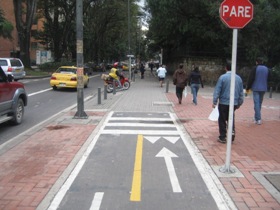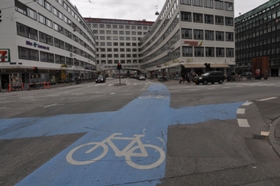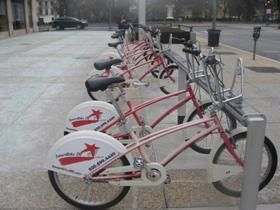On the privatisation of everything: bike hire schemes in London and abroad
We ought not as a rule to satanise the privatisation of urban infrastructure, argues transport researcher Carlosfelipe Pardo. Yet when it comes to cycling, despite the worldwide trend towards privately-operated hire schemes, the benefits are so great and costs so small that there is no sense in selling away part of the public domain when a city like London can easily afford not to.
Londoners are now waking up to the intricacies of public bicycle systems and their contracting arrangements. Justin McGuirk argued last week that the Barclays Cycle Hire and Superhighways were further examples of the privatisation of urban space, in this case the roadspace of London. Be it as it may, this is not so innovatingly cruel as he makes out, nor is it the only such example in the world.
First of all, privatising urban road space is not in itself a good or bad idea, and not to be confused with the act of branding it. Though it is true that public space is exactly that (public!) and should be kept that way, it is also true that in some cases the private sector can maintain and manage roads more appropriately, and can charge more accordingly. Road concessions have been around for decades — whenever you pay a road toll, there is a good chance that the road is being maintained by a private company, with the toll you pay going 100 per cent to them.
This last detail is a problem. Road charging is a good idea as long as it satisfies various requirements, amongst them that the charge reflects the full cost of driving an automobile including all externalities, and that the revenue is used not only for road maintenance but for other purposes. With 100 per cent concessions neither of these conditions are met.
But enough about roads for cars. Regarding bikes, there is no public bicycle system in the world that has been able to finance itself only by operating costs. Most city governments have yet to be convinced that cycling is good for the city and that it should be promoted strongly. Thus, from Vélib' to Bixi to Ecobici, these systems are not operated by a city government nor financed by them. They are almost all given as 100 per cent concessions to a private operator, who must subsidise their operations with government funds or with revenue from other areas.
In the case of Paris, Vélib' is run by the advertising company JCDecaux who, in return for operating the scheme, has exclusive rights for all street advertising in the city. Stories from government hallways tell that the advertising giant has greatly inflated the prices of the bicycles, the operating costs, and in some cases that the level of vandalism has been exaggerated.
The same cross-subsidy model is used by JCDecaux in Lyon, and by their competitor ClearChannel in Barcelona and Washington DC. Advertising companies typically propose the same model when selling public bicycle schemes to other cities.
On the other hand, Germany has tough anti-monopoly regulations which rule out such schemes. Instead, local rail operating company Deutsche Bahn developed their own call-a-bike scheme subsidised as part of the public transport system. Santiago de Chile has set up a local system in the borough of Providencia, fully subsidising a local company, B'easy, to operate the scheme, using local, mostly manual, technology.
Coming back to London, I would propose that we should not satanise the privatisation of roads or public services if done properly … yet I can only apply this to car-related infrastructure, not bicycle-related.
Bicycle infrastructure is low-cost and high impact. It only takes a tiny fraction of a city's budget to deliver a government-owned and operated cycling programme. If Santiago de Chile can manage it, so can London, especially since, as Simon Jenkins points out, London has money to burn these days. There is also a risk in the contracting of private operators that a breakdown of relations causes an operator to terminate a scheme unilaterally or remove cycle infrastructure over a breach of contract. Cities should not leave themselves vulnerable to these possibilities.
If a government seriously understands that promoting cycling generates benefits in public health, urban space efficiency, economy, environment and carbon emissions, it should not be necessary to look for private partnerships to pay for public bicycles, cycle lanes, covered and guarded bicycle parking, and all other cycling infrastructure. We don't seek these arrangements for pedestrians, nor should we for cyclists.


Cycle lanes in Bogotá


Cycle lanes in Copenhagen


Bikes in Santiago de Chile and Washington DC
All photos © Carlosfelipe Pardo.

